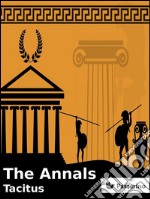Tacitus eBooks
eBooks di Tacitus di Formato Mobipocket
The annals. E-book. Formato Mobipocket Tacitus - Passerino Edtore, 2016 -
"The Annals" by Roman historian and senator Tacitus is a history of the Roman Empire from the reign of Tiberius to that of Nero, the years AD 14–68. Publius (or Gaius) Cornelius Tacitus (c. AD 56 – after 117) was a senator and a historian of the Roman Empire. Translated by: Alfred John Church (1829-1912) and William Jackson Brodribb (1829–1905)
The Germany and the Agricola. E-book. Formato Mobipocket Tacitus - Perennial Press, 2018 -
The following pages contain translations of the first two of these works. The "Germany," the full title of which is "Concerning the situation, manners and inhabitants of Germany," contains little of value from a historical standpoint. It describes with vividness the fierce and independent spirit of the German nations, with many suggestions as to the dangers in which the empire stood of these people. The "Agricola" is a biographical sketch of the writer's father-in-law, who, as has been said, was a distinguished man and governor of Britain. It is one of the author's earliest works and was probably written shortly after the death of Domitian, in 96. This work, short as it is, has always been considered an admirable specimen of biography on account of its grace and dignity of expression. Whatever else it may be, it is a graceful and affectionate tribute to an upright and excellent man...
The Reign of Tiberius. E-book. Formato Mobipocket Tacitus - Perennial Press, 2016 -
Kings were the original Magistrates of Rome: Lucius Brutus founded Liberty and the Consulship: Dictators were chosen occasionally, and used only in pressing exigencies. Little more than two years prevailed the supreme power of the Decemvirate, and the consular jurisdiction of the military Tribunes not very many. The domination of Cinna was but short, that of Sylla not long. The authority of Pompey and Crassus was quickly swallowed up in Caesar; that of Lepidus and Anthony in Augustus. The Commonwealth, then long distressed and exhausted by the rage of her civil dissensions, fell easily into his hands, and over her he assumed a sovereign dominion; yet softened with a venerable name, that of Prince or Chief of the Senate. But the several revolutions in the ancient free state of Rome, and all her happy or disastrous events, are already recorded by writers of signal renown. Nor even in the reign of Augustus were there wanting authors of distinction and genius to have composed his story; till by the prevailing spirit of fear, flattery, and abasement they were checked. As to the succeeding Princes, Tiberius, Caligula, Claudius, and Nero; the dread of their tyranny, whilst they yet reigned, falsified their history; and after their fall, the fresh detestation of their cruelties inflamed their Historians. Hence my own design of recounting briefly certain incidents in the reign of Augustus, chiefly towards his latter end, and of entering afterwards more fully into that of Tiberius and the other three; unbiassed as I am in this undertaking by any resentment, or any affection; all the influences of these personal passions being far from me...


